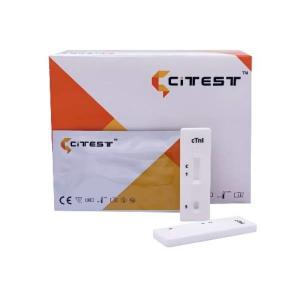One Step Troponin I (CTNI) Rapid Diagnostic Test Kit to diagnose
Myocardial Infarction and Acute Coronary Syndrome
| Product: | One Step Troponin I (CTNI) Rapid Diagnostic Test Kit To Diagnose
Myocardial Infarction And Acute Coronary Syndrome |
| Format: | Cassette |
| Certificate: | CE |
| Pack: | 10T |
| Shelf Life: | 2 Years |
| Specificity: | 99.00% |
| Cut-Off: | 0.5 Ng/mL |
| Cat. No.: | CTI-402 |
| Specimen: | WB/S/P |
| Reading Time: | 10 Minutes |
| Storage Temperature: | 2-30°C |
| Sensitivity: | 99.40% |
| Accuracy: | 99.10% |
Applications:
Qualitative determination of cardiac troponin I (cTnI) in human
serum, whole blood or plasma specimen is used as an aid in the
diagnosis of Myocardial Infarction such as Acute Myocardial
Infarction, Unstable Angina, Acute Myocarditis, and Acute Coronary
Syndrome.in the clinical lab, physician office and other
professional organizations
Description:
Cardiac Troponin I (cTnI) is a protein found in cardiac muscle with
a molecular weight of 22.5 kDa [4]. Troponin I is part of a three
subunit complex comprising of Troponin T and Troponin C as well.
Along with tropomyosin, this structural complex forms the main
component that regulates the calcium sensitive ATPase activity of
actomyosin in striated skeletal and cardiac muscle [5]. After
cardiac injury occurs, Troponin is released into the blood 4-6
hours after the onset of pain. Troponin I remain elevated for 6-10
days, thus providing for a longer window of detection for cardiac
injury as compared to other cardiac markers.
One Step Cardiac Troponin I (cTnI) Test is a simple test that
utilizes a combination of anti-cTnI antibody coated particles and
capture reagent to selectively detect cTnI in whole blood, serum or
plasma. The minimum detection level is 1 ng/ml.
How to use?
Allow the test, specimen, buffer and/or controls to reach room
temperature (15-30°C) prior to testing.
1. Bring the pouch to room temperature before opening it. Remove
the test cassette from the sealed pouch and use it as soon as
possible.
2. Place the cassette on a clean and level surface.
For Serum or Plasma specimen:
. Hold the dropper vertically and transfer 2 drops of serum or plasma (approximately 50 µL) to
the specimen area, then add 1 drop of buffer (approximately 40 µL), and start the timer. See illustration
below.
For Venipuncture Whole Blood specimen:
. Hold the dropper vertically and transfer 3 drops of whole blood (approximately 75 µL) to the specimen area, then add 1 drop of buffer (approximately 40 µL), and start the timer. See illustration
below.
For Fingerstick Whole Blood specimen:
. To use a capillary tube: Fill the capillary tube and transfer
approximately 75 µL of fingerstick whole blood specimen to the
specimen area of test cassette, then add 1 drop of buffer (approximately 40 µL) and start the timer. See illustration
below.
. To use hanging drops: Allow 3 hanging drops of fingerstick whole blood specimen (approximately 75 µL) to fall into the specimen area of test
cassette, then add 1 drop of buffer (approximately 40 µL) and start the timer. See illustration below.
3. Wait for the colored line(s) to appear. Read results at 10
minutes. Do not interpret the result after 20 minutes.
INTERPRETATION OF RESULTS
(Please refer to the illustration above)
POSITIVE:* Two lines appear. One colored line should be in the control line region (C) and
another apparent colored line should be in the test line region
(T).
*NOTE: The intensity of the color in the test line region (T) will vary
depending on the concentration of cardiac Troponin I (cTnI) present
in the specimen. Therefore, any shade of color in the test line
region (T) should be considered positive.
NEGATIVE: One colored line appears in the control line region (C). No line appears in the test line region (T).
INVALID: Control line fails to appear. Insufficient specimen volume or
incorrect procedural techniques are the most likely reasons for
control line failure. Review the procedure and repeat the test with
a new test. If the problem persists, discontinue using the test kit
immediately and contact your local distributor.


